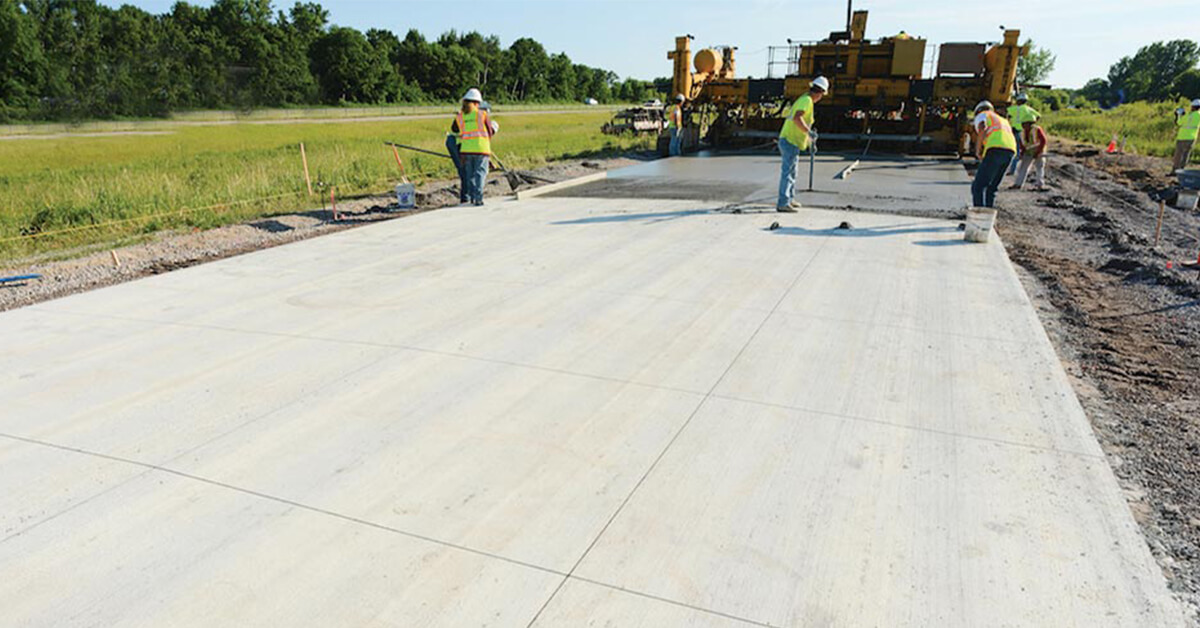The intelligent use of concrete as a building material can promote social, economical, and environmental development; thus improving the nation’s development and growth quality. Concrete is not only used in building construction but also can be used in road construction. The use of concrete for infrastructure works such as concrete roads will help in reducing environmental impact. This is due to reduced dependency on asphalt mix, in which the primary raw material is a petroleum base. The adaptation of concrete in road construction will also directly contribute towards the greater sustainable future.
Inherently, concrete offers many superior benefits and advantages to any type of construction. Do I sound a bit bias; hey what you can expect from a man spent over 20 years in the concrete field. We will discuss the overall and general benefits of concrete in a series of other articles. In this article, let us keep our focus on concrete for road pavement.
Concrete offers a number of significant advantages compared to the traditional asphalt roads or also known as premix road. So of the most notable advantages are greater durability, higher tolerance, better visibility in the night and after rain, superior resistance to extreme weather changes, lower life-cycle cost, and friendlier to the environment compared to asphalt.
Properly designed concrete roads and pavements can go a long way without any need for major maintenance or rehabilitation. There are roads that already in service for well over 40 years without requiring any major maintenance. Why is this important? Fewer needs for maintenance means fewer road closures for road works. Therefore, there would less traffic congestion and delays. So, what does that mean? As you probably already know that idling cars emits the same amount of pollutants as moving cars; at least in the later we get to reach our destination.
Can you see now how important it is to have a road made of reliable and durable material that will minimize the maintenance shutdowns and closures?
“Fuel consumption is a major factor in the economics of roading, with the rolling resistance of the pavement being an important contributor to the fuel consumption and the corresponding CO2 production. Rolling resistance can be attributed in part to a lack of pavement rigidity. In the case of a heavily loaded truck, energy is consumed in deflecting a non-rigid pavement and sub-grade. Using rigid concrete pavement will result in less fuel consumption, and a decrease in associated emissions.” ~ Department of Civil Engineering at The University of Texas at Arlington: The Transportation Research Board (TRB) Special Report 285
Concrete Road Advantages Over Asphalt
Concrete Roads provides Greater Durability
Generally, concrete can be designed and made to last for over 50 years without any major durability related issues. This is also true when comes to the road pavement. Using concrete in road construction is just another use of concrete. So, if the concrete is formulated and mixed according to the specification; there is no reason for it to fail prematurely.
Better Traffic Flows
Better durability means better and long-lasting products. That means the concrete road will have minimum needs for repairs and maintenance thus reducing the traffic closures.
Reduced Life-cycle Cost
Now comes the cost. I have to agree that the initial investment for concrete roads is definitely higher (but only marginal) compared to asphalt roads. However, if you take into account the maintenance cost and period; then the marginal increase in initial cost is justifiable. Apart from annual maintenance; asphalt roads also need to be completely re-surfaced after a few rounds’ major maintenances, and this largely depends on the traffic volume.
Therefore, concrete road pavement still comes back as a cost-effective long term solution.
Reduced Temperature on Concrete Roads
Being friendlier to the environment is the second nature of concrete. Due to its inherently lighter color properties; concrete road pavements provide a good reflective surface which in return minimizes the ‘urban heat island’ effect. The lighter greyish color has a higher solar reflectance index, making the surrounding environment significantly cooler compared to an asphalt road. And for road users like you and me, it means we can have slightly longer-lasting tires; thus, saving us some money.
Better Light Reflection and Safety with Concrete Roads
Concrete reflects slightly more than 30% light compared to an asphalt road. This is very crucial especially for night driving as it will improve visibility significantly. Better reflection also means that the intensity of the street lighting can be reduced thus saving the tax-payers money.
Reduced Rolling Resistance
Due to its rigidity, concrete roads create less resistance for the vehicle’s wheels on it to roll. Thus, resulting in lesser fuel consumption for the user compared with the vehicle traveling at a similar speed on asphalt road.
Concrete Roads are Recyclable
One day, everything will come to an end; and this is also true for concrete roads. After an extensive reliable service life, concrete road pavement will need to be upgraded. The beauty of concrete pavement is that the existing road can be hacked, crushed, and reused in the new concrete road either as raw material for the concrete itself or as the crusher run base material.
Final Note on Concrete Road
Concrete has been at the forefront in helping to develop and maintain sustainable, cost-effective, and environmental-friendly raw material for major infrastructure projects. The use of concrete for roadworks are not limited to just making news roads; this material also has been used extensively for rectification, maintenance, and rehabilitation purpose in other types of pavements. Not only this material provides good sustainable benefits to the infrastructure planners; but also, to the road users. As explained earlier, many of the inherent benefits of concrete roads result in indirect financial benefits to road users.










